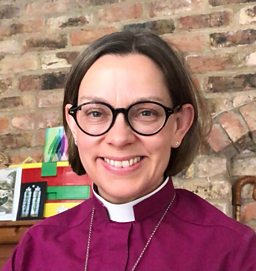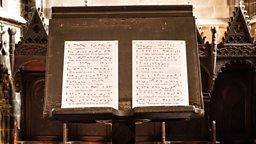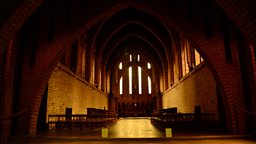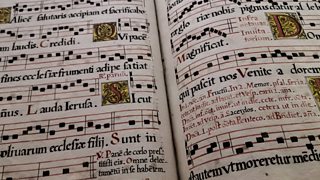What is The Divine Office?
By the Rt Revd Dr. Helen-Ann Hartley, Bishop of Ripon
Near to where I live are the magnificent ruins of Fountains Abbey, a UNESCO World Heritage Site. Founded in 1132, the Abbey was a centre of monastic work and prayer in the Cistercian tradition until its dissolution by Henry VIII, in 1539.
I visit the Abbey ruins most Saturday mornings to participate in a parkrun. It often occurs to me that the monks’ perspective might be one of curious tolerance at this group of runners seeking personal-best times, and pausing perhaps to catch a breath at the foot of one of a number of inclines around its undulating paths.
Certainly, there is a link between the themes of pausing and physicality with the rhythms of prayer embodied in the cycle of the Divine Office.
As we move through the hours of night and day, with periods of resting and awakening, the emphasis in the Divine Office is an invitation to pause and turn to God in acknowledgement of God’s mercy and providence.
There is a profound sense of reliance on God, and of partnership with God in observing a cycle that the Office’s originator, Benedict called simply: "The Work of God".


Benedict’s rule for Monasteries, which dates to 516 sees work as embracing periods of rest and prayer. As God is active in the world, and as the monastic community lives to bear witness to divine presence, the theme of work embraces rest and prayer as well as activity and industry.
Let us take part in the psalmody in such a way that our mind may be in harmony with our voice.From The Benedictine Rule
Chapter 19 of the Benedictine Rule is entitled: “On the Manner of Saying the Divine Office”. It contains the following: “We believe that the divine presence is everywhere and that ‘the eyes of the Lord are looking on the good and the evil in every place.’ But we should believe this especially without any doubt when we are assisting at the Work of God”.
It continues: “Let us therefore consider how we ought to conduct ourselves in the sight of the Godhead and of His Angels, and let us take part in the psalmody in such a way that our mind may be in harmony with our voice.”
This sense of balancing is perhaps at the heart of what the Office achieves: in offering prayer and praise to God one becomes keenly attuned to the Divine, and thus better able to discern God’s will, acknowledging that an answer to prayer may lie in the midst of that balance: unspoken, yet held; hopeful in its persistent voicing.

The voice that is heard most clearly in the hours of the Office is that of the Psalmist. This rootedness in the Judaeo-Christian tradition is one that the monk and writer Thomas Merton describes in his own reflections on praying the psalms. “The Church loves to sing over and over again the songs of the old psalmists,” Merton writes, “because in them she is singing of her knowledge of God, of her union with Him” (Praying the Psalms, 1956, Liturgical Press, p. 8).
A distinctive innovation of the Benedictine rhythm of the Office was its communal nature. It is the monastic community that sings together, even while out in the fields at work, the music of the Psalms was constant, alongside periods of silence, another feature of the Benedictine rule and understood more as thoughtful engagement rather than the absolute absence of noise.

As the Office moves through the hours of night and day and in its calling together the faithful to pray, the Office encourages a deeper awareness of the hours of the day not simply as time passing by but as an entering into the depths of God’s eternal nature.
This is a time that attends to an awareness of the present moment.
The Benedictine monk David Steindl-Rast writes about the monastic understanding of "hour" which relates to the Greek hora: "a soul measure" (Music of Silence, Ulysses Press, 1998, pp. 3-4). An example of this surely resides in the first of the Offices: Matins (sometimes referred to as "Vigils").
It may seem strange heralding the light at a time when darkness envelops the soul. With Matins, the community offers praise with the voice of the Psalmist that says of God: “Even the darkness is not dark to you; the night is as bright as the day, for darkness is as light to you” (Psalm 139.12).
That is the beauty of the liturgy of the Divine Office as it offers perspective on our hurried lives, and an opportunity to retune ourselves to the music of the heavenly spheres and so look again on our world with renewed hope.
Music for the Hours

As part of Radio 3's Capturing Twilight season, The Tallis Scholars sing settings of words and psalms associated with each of the eight offices, or Canonical Hours, across the day, beginning with Matins.
-
![]()
The music of The Divine Office
Peter Phillips, conductor of The Tallis Scholars, writes on preparing the music for Radio 3's modern re-creation of The Divine Office.

Capturing Twilight programmes on Radio 3
-
![]()
Words and Music: Twilight
The dimming of the day reflected in works by Adrienne Rich, James Joyce and Peter Porter, read by Clare Perkins and Neil Pearson, with music by Wagner, Sally Beamish and The Fall.
-
![]()
Between the Ears: Capturing Light
Printmaker Norman Ackroyd leaves on a boat at dawn to paint the sunrise on Suffolk's crumbling cliffs from the North Sea for the first time, with a new poem by Nancy Campbell.
-
![]()
In Tune: Live from Armagh, Northern Ireland
Sean Rafferty discovers more about the many different types of twilight as he visits the Armagh Observatory and Planetarium.
-
![]()
Capturing Twilight: Sarah Walker with a brightly lit musical mix
Sarah Walker plays an uplifting selection of music to make the most of the lightest time of the day during the darker months.





